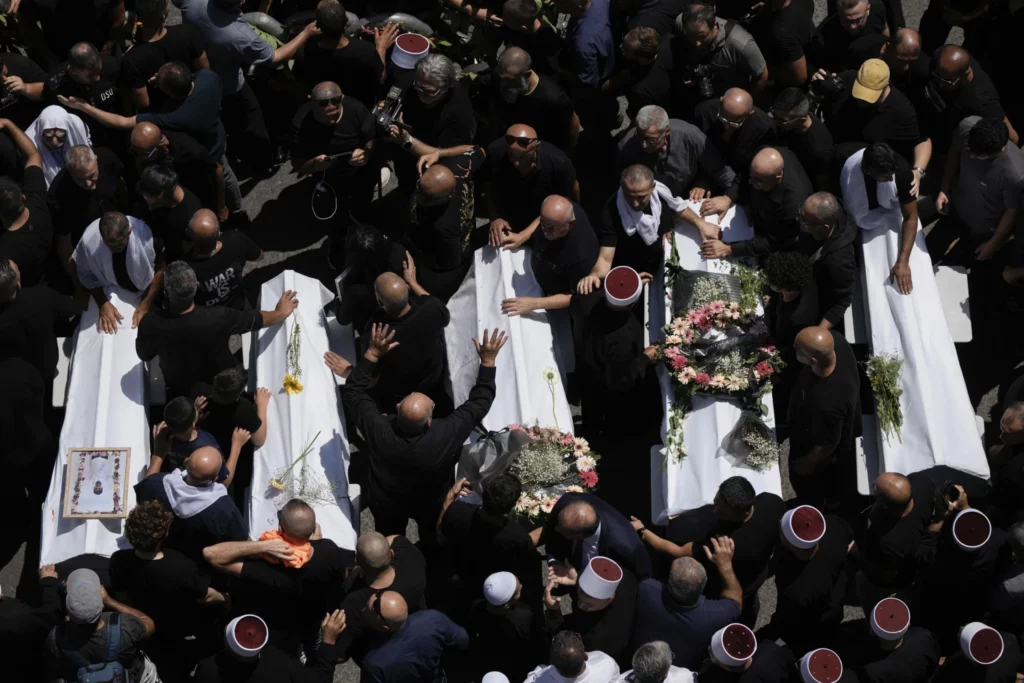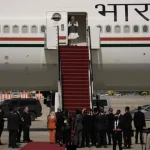
Prime Minister Benjamin Netanyahu warned that Israel will retaliate against Hezbollah for an aerial attack that left a dozen children dead in the Golan Heights.
The strike, which occurred on Saturday and hit a soccer field, threatens to be the catalyst for further escalation, and potentially a dramatic one, in the limited military confrontation between Israel and Hezbollah in the northern part of Israel and southern Lebanon.
“Like all Israeli citizens, and I must say like many around the world, we were deeply shaken by this horrific killing,” Netanyahu said during a visit to Majdal Shams, the site of the attack, according to a statement issued by his office. “These children are our children. … The State of Israel will not, and cannot, let this pass. Our response will come and it will be severe.”
Netanyahu and Israeli Security Agency Director Ronen Bar met with the bereaved families to express their condolences.
The prime minister convened the security Cabinet on Sunday and at the end of the meeting, the Cabinet authorized Netanyahu and Defense Minister Yoav Gallant to decide the manner and timing of their response, according to Netanyahu’s office.
The United States and several Western countries have repeatedly and desperately sought to quell the fighting between Israel and Hezbollah to prevent an escalation and an all-out war, which experts believe would be highly destructive and deadly for both sides given the arsenals of both militaries.
U.S. National Security Council spokesman John Kirby told reporters on Monday that the concerns of an all-out war are “exaggerated,” and added, “There’s no reason for that outcome to occur.”

Hezbollah began firing rockets into northern Israel shortly after Hamas, which is based in Gaza and is Israel’s neighbor to the west, carried out its massacre on Oct. 7, 2023. Hamas terrorists and others overpowered the border wall, broke into several communities near the border, slaughtered roughly 1,200 people, mainly civilians, and took another roughly 250 people hostage, about a hundred of whom are still held by the terrorist group in Gaza.
The cross-border rocket and missile attacks have forced tens of thousands, if not more, of civilians to evacuate their homes in both northern Israel and southern Lebanon and are still displaced.
There have been several moments where the attacks threatened to lead both sides into a broader war, though it hasn’t happened yet.
U.S. Secretary of Defense Lloyd Austin previously warned that an all-out war between Israel and Hezbollah “would be a catastrophe for Lebanon and it would be devastating for innocent Israeli and Lebanese civilians.”
Hezbollah and Hamas are both supported by Iran and are two of Tehran’s proxies in the region. The Israeli military alleged that the rocket Hezbollah fired was made by Tehran.
“Here, Hezbollah, with Iranian backing, fired an Iranian missile that cut short the lives of 12 pure souls, 12 boys and girls who were playing soccer here and who, unfortunately, did not manage to reach shelter,” Netanyahu said. “Do not be disheartened. Do not lose hope in the face of the assault by the Iranian and Hezbollah axis of evil.”
CLICK HERE TO READ MORE FROM THE WASHINGTON EXAMINER
In Israel’s perspective, it is fighting a war against Iran indirectly through the proxies, which also includes the Houthis in Yemen and multiple militias in Iraq and Syria. This shadow war came to the light this spring when Tehran launched an aerial attack against Israel that included about 300 missiles, rockets, and drones, some of which were launched from Iranian territory.
Israel, with the help of the U.S. and several allies, was able to intercept nearly all of them.
The Houthis, which are also carrying out regular attacks on commercial vessels in the Red Sea, have launched about 200 attacks against Israel since Oct. 7, most of which have been intercepted. Earlier this month, a Houthi drone got through Israel’s air defenses and killed a civilian in Tel Aviv.
Israel targeted the Yemeni port of Hodeidah in retaliation for that attack.





